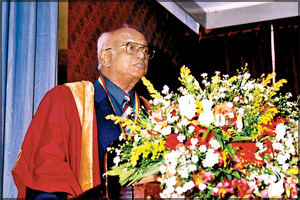|
Health watch |
-Compiled and coordinated-by Edward Arambewala |
Uncertainties of Medicine
Dr. Dennis T. Aloysius visiting lecturer Post Graduate Institute of
Medicine (PGIM) and member of the Healthwatch Medical Advisory panel,
writing to the Healthwatch on - uncertainties of medicine says:
“Whatever form this uncertainty takes it can only be resolved if it
is perceived as a problem. Yet much of our medical training serves to
prevent us from disclosing our own uncertainty to ourselves and to
others”.
 |
|
Dr. Dennis T. Aloysius |
The practice of medicine is an art and a science. Medicine is an
applied science and an uncertain one, involving a considerable measure
of subjectivity.
The medical profession has paternalistically projected into the minds
of our practice population an image of being all-knowing. Most patients
have complacently helped to foster this perception and seek solace and
comfort in it, for who will ever seek advice or care from a person who
admits, even honestly, to be unaware of the accurate answers to most
questions.
Are we not just role-playing?
The pretence seems acceptable, because it is what the public and
profession find mutually satisfying and are comfortable with. But I ask
you the question are we in the medical profession deceiving those who
place implicit trust in us?
On the one hand pretence seems acceptable, because it is what the
public and profession find mutually satisfying and are comfortable with.
On the other hand, in the case of a diagnosis that is elusive, would it
not be wise to state that the diagnosis is uncertain but everything
possible is being done to establish it.
The balance between inspiring confidence and trust, of mild deception
and honesty is precarious and fragile, and needs to be handled with
sensitivity with the interest of the patient at heart. So the practice
of medicine often involves an element of play-acting.
Why not just one single book
If medicine had within its compass of knowledge and understanding,
nearly everything there is to know about illness and health, why have we
not published a few or better still, just one single book that
encompasses our knowledge, such as the great religions have done? For
example, we could have published a single book such as the Dhammapada or
Bhagavad-Gita or Bible or Koran or Talmud. Instead, we are currently
publishing several medical texts and over 5,000 medical journals and
nearly 2,000,000 biomedical articles annually.
Some of the medical articles contradict the previous published,
“proven” and universally accepted views. We are constantly revising our
views. We pompously and patronizingly term this “the progress of
science,” “match of science” the “evolution of knowledge”.
This is certainly true but how can we explain away to patients,
basing our earlier advice on these disproved premises and thus having
given wrong advice and made misleading statements over the years. This
may have caused harm to our credulous patients.
The expectation
The expectation that a doctor should have all the answers is as bad
for patients as it is for the doctors themselves.
There are several doctors do not admit to any uncertainty. They are
very vocal at meetings and lectures assuring others that the correct
path of clinical management is obvious. Their colleagues, feeling
undermined, ask no questions and express no doubts, and are silent.
Paradoxically these same doctors in private conversations freely admit
that medicine is an uncertain science.
Underestimated
Whatever form uncertainty takes, it can only be resolved if it is
perceived as a problem. Yet much of our medical training serves to
prevent us from disclosing our own uncertainty, to ourselves and to
others. As a result, the prevalence of uncertainty and the magnitude of
its impact on doctors and patients are therefore underestimated.
Hiding the fact
In situations where clinicians face uncertainty, the use of practice
guidelines may be of assistance. Some pompous doctors assert that
guidelines are only necessary for the ignorant and that resorting to
them is a sign of inadequacy.
Such hostility usually hides the fact that these same clinicians
often work to their own set of private guidelines. Other common
criticisms are that guidelines erode clinical freedom or lead to the
practice of cookbook medicine’.
Clinical freedom is all very fine as long as it is used to benefit
patients. When it is used to continue outmoded and harmful practices, or
to prevent the adoption of more effective treatment, it becomes clinical
anarchy. Research and experience demonstrate that this can happen all
too often.
Why practice guidelines are there
Guidelines will not remove our freedom, or indeed our obligation, to
think and to place our patients’ needs first. Even when working in areas
where excellent guidelines exist, doctors will contravene them when
patient preference or commonsense so dictate. Practice guidelines are
there to help us, not to tyrannize us.
Where there is uncertainty doctors should tactfully tell the patient
and carers the truth, pure and simple. But as Osca Wilde once said
“Truth is rarely pure and never simple”.
1st International conference in Sri Lanka
Towards understanding psychology
The first international conference Towards Understanding Psychology
will be held in Sri Lanka at the Peradeniya Medical Faculty next month
November 7th and 8th.
The Department of Philosophy and Psychology of the Faculty in a
release to the Healthwatch on the conference says:
The conference will bring together professionals from different
psychology-related expertise, providing an opportunity for addressing
some of the key practical challenges that psychologists face in
developing as an separate academic and an applied field in contemporary
Sri Lanka.
It will also serve to improve ties among psychologists by creating an
environment conducive to a free exchange of ideas. As a whole, the
conference will play a critical role in the development and
professionalisation of psychology within the country.
The following panel discussions will take place at the sessions by
expert professionals in the fields.
1. Culture and Psychology
2. The Application of Psychology to Improve Human well-being
3. The Application of Psychology in Work organisations including the
Military
4. The Profession of Psychology
The aim, purpose, participants and background to the conference the
organising committee says:
Background: An on-going civil war and after effects of the Asian
tsunami (2004) has left Sri Lanka grappling with many psychology related
issues but with few who are competently able to address them.
Despite a burning need for competent practitioners within this
specialised field, only one department within the entire university
system grants a degree in psychology which has resulted in a dearth of
new psychologists.
The small number of existing Sri Lankan psychologists are then
absorbed into various isolated academic departments and institutions
around the country, depriving the psychology community of a collective
voice to express their many common and pressing concern.
The absence of a recognised professional body to support, develop and
control its practice, has placed Sri Lanka’s public and the few trained
psychologists in a vulnerable predicament, as individuals without even
basic qualifications in the subject are dawn to advice and direct
government efforts in the name of psychology. Hence, the proposed
conference aims to initiate a forum through which psychology related
concerns in Sri Lanka will be addressed collectively.
Aim of conference: To initiate a proficient community of
professionals engaged in psychology.
Participants: Psychologists in Sri Lanka, with a special emphasis on
those working in the national university system.
Purpose: * Improve ties among psychologists, * Create an environment
conducive to a free exchange of ideas, * Explore the role of psychology
in Sri Lanka, * Develop and professionalise psychology in the country.
The main sponsors are the American and UK Psychological Associations.
Participating institutions -
University of Colombo: Department of Educational Psychology, and
National Education Research and Evaluation Centre (NEREC), Department of
Sociology, Department of Psychological Medicine, Faculty of Graduate
Studies.
University of Peradeniya: Department of Agricultural Economics and
Business Management, The Department of Philosophy and Psychology.
University of Kelaniya: Medical Education Centre.
Open University of Sri Lanka: Department of Early Childhood
Education.
University of Ruhuna: Department of Psychiatry.
********************************************************************
Some stress relieving strategies
Dr. Kelum Pelpola
To get back in control when allergy symptoms have you reeling,
consider the following stress-relief strategies:
 1. Figure out what’s adding to your stressful feelings and remove or
reduce the source. If your stress is from overwork, learn to delegate,
especially during allergy season. If your stress is from overextending
yourself, rethink your priorities. 1. Figure out what’s adding to your stressful feelings and remove or
reduce the source. If your stress is from overwork, learn to delegate,
especially during allergy season. If your stress is from overextending
yourself, rethink your priorities.
2. Get plenty of sleep every night, not just on weekends. Getting in
bed and resting can restore the body’s balance and help the allergic
body heal.
3. Set priorities and budget your time to allow for a little
relaxation. Having a more balanced life with moments of relaxation each
day can help you deal with allergy symptoms more effectively.
4. Exercise daily. Even if you only have time to take a walk,
exercise helps reduce stress hormones that may cause you to feel keyed
up. And remember, exercise produces epinephrine, which acts as a natural
decongestant, helping you breathe better.
5. Learn to meditate. Twenty minutes of meditation once or twice
daily can help you reduce stress and feel more relaxed.
6. Keep taking your allergy medications. While that may not sound
like a stress-relief strategy, it might surprise you. Stress may cause
anxiety and depression, and depressed individuals are less compliant
with their medications. So stay on track!
Folate (folic acid) helps prevent breast cancer and heart attacks
D. P. ATUKORALE
Folate and folacin (vitamin B9) are the names used to describe a
group of substances which are chemically similar to folic acid. Its
importance to growth and prevention of anaemia was established in 1946.
The word folate comes from the Latin word “folium” meaning “leaf” which
should tell us something about the best sources of the above vitamin.
 Importance and functions Importance and functions
(a) Folate plays an essential part in the formation of D. N. A. and
R. N. A;
(b) With vitamin B12 it plays an essential part in amino - acid
synthesis;
(c) Folate is essential for formation of red blood cells (RBC) and
white blood cells (WBC);
(d) Folate contributes to the formation of the iron constituent of
haemoglobin.
Human beings need less than 5 mg (one tablet) of folic acid per day
which - costs about 30 cents in the private sector.
Most meats are poor sources of folate and vegetarian diet is full of
vit B9 (folate) and it is advisable for pregnant and lactating mothers
to take vitamin supplements containing folate. Most of the common
multivitamins available in our pharmacies contain folate but few very
popular brands don’t contain folate.
Best vegetable sources of folate
These are spinach, cabbage, asparagus, soya bean and soya products,
akra (“ladies fingers”), peanuts and cashew nuts, legumes (such as
beans, lima bean (“mekaral”), lentils (dhal) and kidney bean,
chickpeas), broccoli, bean sprouts, peas, avocado, papaya, and all dark
green vegetables.
Folic acid deficiency anaemia
This type of megaloblastic anaemia was quite common in the poor
pregnant mothers in our rural areas and when I was working as a house
officer in 1965 in obstetric wards, we used to get severely anaemic
pregnant mothers from rural areas such as Karawenella and we used to
administer iron injections or iron tablets, folate, and anthelminthic
drugs and the few cases investigated by us by doing peripheral blood
picture, showed evidence suggestive of megaloblastic anaemia.
Majority of these pregnant mothers used to have haemoglobin levels
below 5 grams percent and needed urgent blood transfusions. At that time
we had no facilities to do serum B12 levels and serum folate levels.
It is noteworthy that B12 deficiency anaemia has not yet been
reported among Sri Lankan vegetarians, as far as I am aware. I used to
see a few cases of B12 deficiency (pernicious) anaemia in U.K. when I
was following the teaching rounds with the haematologist, at Manchester
Royal Infirmary, U.K. in 1971 - 1973 period but never seen one in Sri
Lanka during my medical carrier.
Folate helps prevent breast cancer
Researchers evaluating folate intake in 11699 post menopausal women
from the Malmo Diet and Cancer cohort found that the intake of folate
correlated with the lower risk of invasive breast cancer in the post
menopausal women (Ericson U. et al, Am I. Clin. Nutr, August 2007, 86
(2) 434 - 443).
In the above study women who consumed an average of 456 micrograms of
folate per day had 44 per cent lower risk of breast cancer compared with
women averaging 160 micrograms per day. As mentioned earlier, folate
deficiency could impair DNA synthesis and repair, and evidence suggests
that folate deficiency could lead to development of certain types of
cancers.
Folate prevents neural tube defects
It is common knowledge among doctors, nursing staff and most of the
laymen that administration of folate during the early months of
pregnancy prevents occurrence of neural tube defect in the foetus. As
such all the doctors prescribe folic acid to women during pregnancy.
Folate prevents heart attacks
Homocysteinaemia is a known coronary risk factor and I prescribe 5 mg
(one tablet) of folic acid to all those patients with potential coronary
heart disease and to all patients with coronary heart disease. Folic
acid is an extremely cheap vitamin B tablet.
To conclude it is advisable to prescribe 5 mg (1 tablet) of folic
acid to (a) all females over age of 40 with a view to prevent breast
cancer (b) to all patients with coronary risk factors (c) to all
pregnant women with a view to prevent neural tube anomalies in the
foetus.
As far as I am aware physicians prescribe folic acid to most of the
megaloblastic anaemia patients (after excluding B12 deficiency in which
case folate should never be given before administering B12) other
indications for folic acid administration such as chronic haemolytic
anaemias, renal dialysis patients etc will not be discussed in this
article.
Dr. Upali Mendis on Dr. Robert Emmanuel Selvarajah
A leading figure in the medical field - Dr. Robert Emmanuel
Selvarajah, former Consultant Ophthalmologist of the Eye Hospital
Colombo, after a brief illness, passed away peacefully on September 6.
It was at the Eye Hospital that I first met Selva when we were both
trainees. Although he left London on a Commonwealth Scholarship, we were
fortunate to meet once again since I too left to London a year later. I
have fond memories of our time together at lectures as well as work in
the clinics at Moorfields.
After completion of the Fellowship of the Royal College of Surgeons,
Edinburgh, Selva returned to Sri Lanka and served as a Consultant
Ophthalmologist in Trincomalee, Kandy and Colombo.
During this period of committed service in his homeland, he was an
active member of the Ophthalmological Society of Sri Lanka and held
several posts in the Society, ultimately becoming its President.
Regrettably, the ethnic violence of 1983 left Selva no choice but to
emigrate to Canada and later to the USA for the sake of his children’s
education. He practised as a Family Physician in the USA until May this
year when he was diagnosed with a terminal illness.
At the Colombo Eye Hospital, Selva’s service was looked upon with
gratitude and admiration by his patients, subordinate staff and
colleagues.
He was, above all, an unassuming, simple and generous man, always
willing to help anyone in need. I never saw him displaying any anger or
talking disparagingly of others. Despite his position, he never looked
down on others.
He was beloved as a gifted teacher who encouraged his trainees to
learn and accomplish their goals. Whenever there was disagreement among
his colleagues over administrative and academic issues, his intervention
helped to settle them. In addition to these commendable and rare
qualities, Selva had a good sense of humour and was invited as an
after-dinner speaker on innumerable occasions.
I not only greatly valued his friendship, but also his advice on
academic and administrative matters while I was the Director of the Eye
Hospital Dr. Selvarajah’s exemplary life leaves much to learn from and
gives each of us who knew him in various capacities much cause to
celebrate the fact of having been associated with such an admirable man.
Problem-solving dreams
Dr. H. B. Jayasinghe (Consultant Clinical Hypnotist)
 Daydream is a pleasant fantasy indulged in while awake whereas a
dream constitutes a series of scenes occurring while asleep, may be in
broad daylight or at night. Daydream is a pleasant fantasy indulged in while awake whereas a
dream constitutes a series of scenes occurring while asleep, may be in
broad daylight or at night.
While daydreaming may lead to problems rather than solving them, a
dream, irrespective of its time of occurrence can be usefully employed
not only for problem solving but also for entertainment and creativity
enhancement.
Although dreaming is a physiological condition experienced by every
healthy human being, hallucinations, be auditory, visual, olfactory,
gustatory or sensory are all pathological, and experienced only in
psychiatric illnesses such as schizophrenia, delirium tremens etc,
Hallucinations can either be abolished or modified but cannot be used
for problem solving.
(Dr. Jayasinghe has sent this short note in reply to a letter sent by
a Healthwatch reader Abdulla Ziard on daydreams and hallucinations) |

